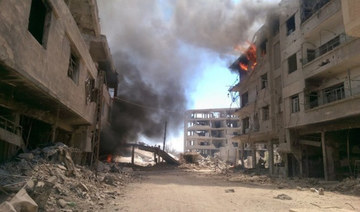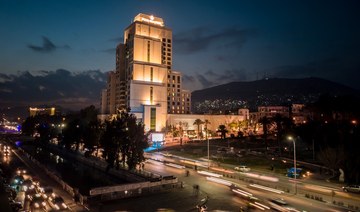CHICAGO: A diverse grouping of Syrian expatriates and Syrian-American community leaders and activists are joining forces in the hope of creating a representative coalition that can effectively lobby for an end to the violence in Syria and an acceptable resolution to the ongoing civil war.
Talking exclusively to Arab News, the organizers of the coalition said that formerly rival groups and their leaders are now working together and coordinating their efforts to focus on how they can help to end the conflict, as a first step toward establishing a more representative government in the country.
The Syrian expatriates held their first “consultative” meeting on Oct. 29 in Washington, during which the 70 participants agreed to work together and plan a followup meeting to develop and advance an agenda to help end Syria’s civil war, which began on March 15, 2011.
Organizers said the diversity of the participants, including more than 70 prominent Syrians, and their “determination to work together” can become a driver to push authorities in the US and Europe to take a more active role in helping Syria get back on track toward a productive future free of violence.
“The goal, if we set aside the need to communicate with this (US) administration and the different American establishment bodies, what is more important is that we need to show and to practice the bringing up of all differences between the Syrians themselves; this will help,” said Samir Al-Taqi, a former member of the Syrian parliament who once served as a consultant to Syrian President Bashar Assad, and before that to his father, former President Hafez Assad.
“All of us believe that without a reconciliation to rebuild a voluntary participation of all Syrians without any pressures, regardless of democracy because democracy doesn’t solve all the issues among people … what we need in Syria is not the opposition to the regime — we need in Syria an alternative to the regime. This is very important.
“So maybe through this we can create not necessarily an opposition but an alternative to the Syria war, allowing every partner in this to come together. I don’t believe there will be any kind of justice in this world, so we need to be conciliatory regardless of justice.”
In his capacity as a close adviser to Assad, Al-Taqi served as director of the Orient Center for International Studies, a research extension to the Syrian Ministry of Foreign Affairs that was based in Damascus. He also represented the Syrian government during the investigation into the 2005 assassination of former Lebanese Prime Minister Rafic Hariri.
Al-Taqi’s relationship with Assad broke down before the civil war began, when he advised the president that an impending conflict could jeopardize the country. He was arrested and tortured before being allowed to leave the country on Aug. 9, 2010. He moved to the US and is currently a non-resident researcher at the Middle East Institute, the American Center for Levant Studies, and a part of the Distinguished Scholars program at Queens University related to the peace process.
Also present at the meeting in Washington were six of 10 former Syrian government ministers who fled the country and found refuge in US, along with activists, business leaders and former diplomats.
Ayman Abdel Nour, a member of the organizing committee, said the primary goal was to create a strong, unified voice to help push for the implementation of UN Resolution 2254, which was adopted on Dec. 18, 2015, and specifically sets out the requirement that the “Syrian People will decide the future of Syria.”
“There have been many efforts to bring the Syrian-American community and Syrian expatriates together to define a strategy to end the conflict and put Syria back on a road to recovery and transition but all have failed because of the inability of all the different sides to come together,” said Abdel Nour, agreeing with Al-Taqi. “I believe we can now overcome those divisions.”
He pointed out that the participants in the meeting came from many parts of the US, including Florida, New Jersey, Boston, Washington State and California.
A leading reformist, Abdel Nour is a consultant to several multinational organizations, including the UN and EU, and advises on civil society and economic development in Syria. A trained engineer and economist, he has testified before the European Parliament, provides consulting services on Middle East public policy to international organizations and is also president of Syrian Christians for Dialogue.
Stressing the “need for unity” if the coalition is to be successful, he said it includes representatives from all sections of Syrian society, including Yazidis, the Syrian-Jewish American community in New York, Druze leaders, Kurds, a Syrian-American student committee in Los Angeles, and members of several of Syria’s 10 societal tribes who are now living in the US.
According to the organizers, the 70 diverse participants at the coalition meeting included:
Hussein Amash, a former minister of state for combating unemployment and head of Al-Furat University. He was jailed in Syria but released because he had American citizenship. He was previously director-general of Kuwait Fund for Arab Economic Development.
Former Minister Taghreed Al-Hajali, a leading Druze sect leader who served as minister of culture.
Wael Mirza, a former political adviser to President Assad.
Edward Hashweh, a leading Syrian attorney from Homs who had close relationships with all Syrian presidents dating back to 1957.
Huda Aljord, a Syrian professor at the University of California, Riverside.
International Attorney Hamid Al-Rifai, who is based in Washington.
Mahmoud Diaba, leader of the Tribes of Palmyra, one of Syria’s 10 tribes, which has an office in Michigan.
Ayman Hakki, a surgeon from Washington.
Lina Murad, who teaches at John Hopkins University.
Hisham Nashwati, head of the Syrian organization Syria Freedom, based in New Jersey.
Nimrod Suleiman, an analyst and commentator on Syria for Al-Arabiya TV.
Zaher Baadrani, director of the Future Movement and of the Islamic Youth Movement in Florida.
Both Al-Taqi and Abdel Nour said that the focus of the coalition is not an effort to continue the existing conflict but to use their influence in the US to convince the Biden administration to help create a “new alternative.”
“The caliber of the leadership attending the meeting puts an end to the criticism that the Syrian-American community is fractured and cannot come together,” said Abdel Nour. “They may be the strongest group to give new momentum to revive the effort to implement UN Resolution 2254.
“We are very optimistic but this is a process. The date of the next meeting is not set but we are working on it. Participation will grow.”















